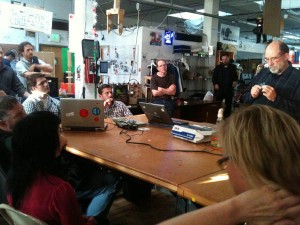Writing Engaging Employee Handbooks
Posted on September 1, 2011
Filed Under Business, Technology, The Writing Life | Leave a Comment
Ever been asked to write an employee handbook? That’s a special challenge because you’re writing on behalf of an organization for the people whose enthusiasm, support and creativity are vital to its success. They don’t cotton to legalese or strictures. An effective handbook needs to be more than simply a recitation of rules. We’re talking, in effect, about technical writing with a human face.
 In this context, we’ve come across a website – klariti.com – with a page on “How to Make Employee Handbooks More Human.” It’s selling an employee handbook template, but it’s modestly priced ($9.99) and might be good to have on hand. Beyond that, though, Ivan Walsh, the writer, has some pertinent tips for putting an engaging handbook together.
In this context, we’ve come across a website – klariti.com – with a page on “How to Make Employee Handbooks More Human.” It’s selling an employee handbook template, but it’s modestly priced ($9.99) and might be good to have on hand. Beyond that, though, Ivan Walsh, the writer, has some pertinent tips for putting an engaging handbook together.
Read more
‘Crowdsourcing’ – the New, Bigger Water Cooler
Posted on August 28, 2011
Filed Under Technology, The Writing Life | Leave a Comment
Infographics take specialized skill to design and execute, but when they’re done well, are they helpful! Here’s an example from The Content Wrangler site: an infographic on crowdsourcing.
Read more
Hanging Out With Our Futures
Posted on August 22, 2011
Filed Under Technology | Leave a Comment
Our colleague Dennis Owen is on the road a lot these days and that’s especially why it would be interesting to get his thoughts on this piece by David Lang from the Make magazine blog, “Surrounding Yourself with the Right People.”
 The piece takes off from a quote, “You are the average of the five people you spend the most time with.” So, it follows, be careful who you spend your time with. That makes a lot of sense in terms of whom to avoid. But is it worth being careful about who you associate with in terms of hoped-for creativity? Probably, but that’s more difficult to demonstrate, at least in the short run.
The piece takes off from a quote, “You are the average of the five people you spend the most time with.” So, it follows, be careful who you spend your time with. That makes a lot of sense in terms of whom to avoid. But is it worth being careful about who you associate with in terms of hoped-for creativity? Probably, but that’s more difficult to demonstrate, at least in the short run.
Lang reflects on his work in sailing big chartered sailboats in San Francisco Bay – a skill he’d picked up in a year and a half.
Read more
Technical Writers Who Speak, Too
Posted on July 30, 2011
Filed Under Technology, The Writing Life | Leave a Comment
Technical writers may be able to get more mileage, and income, from their knowledge if they can speak it, as well as write it. The notion of speaking about technology to an audience may make some writers queasy, but Sarah Maddox found that it can go surprisingly well.
Sara is a technical writer in Australia who does “ffeathers – a technical writer’s blog.” “You could have blown me down with a feather duster if you’d told me that I would speak at a conference,” she writes. “Then I met Joe Welinske and started blabbing about my love of documentation wikis. There was probably a lot of arm waving and even a bit of in-place leaping about. Joe quickly suggested that I speak at the next WritersUA conference. I remember silence. I probably went pale. But I must have said yes, because within a few months I found myself on stage.
“To my absolute astonishment,” Sarah continues, “my presentation went reasonably well. Since then I’ve presented sessions at a few conferences, and I enjoy the experience more each time.”
Read more
Banned Chemicals Being Released From Melting Arctic Ice
Posted on July 24, 2011
Filed Under Government, Technology | Leave a Comment
Folly, sadly, gets to be repeated in nature as in life. That’s how a report in the journal Nature Climate Change struck us just now.
So be extra careful.
What we’re talking about is that pollutants known as “persistent organic pollutants,” or POPs, that were outlawed in 2001 apparently are being released in the melting of Arctic ice due to climate change.
 A study released in the journal looked at atmospheric concentrations of three banned chemicals – DDT, HCH and cis-chlordane – between 1993 and 2009 at a station in Norway’s Svalbard Islands and another in the Canadian Arctic.
A study released in the journal looked at atmospheric concentrations of three banned chemicals – DDT, HCH and cis-chlordane – between 1993 and 2009 at a station in Norway’s Svalbard Islands and another in the Canadian Arctic.
The study found, reports Physorg.com, “a slight rise in secondary emissions, from POPs that had been locked in Arctic ice and snow but were now being gradually released because of warming.”
Read more
As The Space Shuttle Flights End…
Posted on July 21, 2011
Filed Under Government, Technology | Leave a Comment
 “Wheels stopped.” With those words this morning, Atlantis completed the final space shuttle flight and ended 30 years of U.S. orbital space flights.
“Wheels stopped.” With those words this morning, Atlantis completed the final space shuttle flight and ended 30 years of U.S. orbital space flights.
It can be argued that the space flights were exorbitantly expensive and not worth the outlay. We’d disagree. Expensive, yes, but learning often has high costs. The point is the learning itself, and the experience it provides.
NASA has reason to appreciate the generosity of U.S. taxpayers, and we taxpayers have more than a little reason to be appreciative of NASA and its astronauts.
They’ve taken us into orbit, many times now, and helped provide, among other treasures, those magnificent photos of deep space from the Hubble telescope.
Read more
Keep Repetitive Learning ‘Up Front’
Posted on July 11, 2011
Filed Under Technology, Uncategorized | Leave a Comment
 Scott Nesbitt, a technical writing colleague on the Web, raises an interesting question: How do we write manuals or procedures with steps that might involve repetitive skills or insights without bogging the reader down?
Scott Nesbitt, a technical writing colleague on the Web, raises an interesting question: How do we write manuals or procedures with steps that might involve repetitive skills or insights without bogging the reader down?
Repetition, Scott notes, is an effective way of learning but “it gets tedious quite quickly.” So how do we keep procedures from working against themselves by inflicting too much cross-referencing on the reader?
A good question. I haven’t talked with Dennis Owen about this, but he can chime in whenever he pleases.
An approach that occurs to Scott is to state something like this af the beginning of a procedure:
Read more
Another Bookish Aim for the Ages – Digital This Time
Posted on June 14, 2011
Filed Under Technology, The Writing Life | Leave a Comment
It won’t come close to matching the great Royal Library of Alexandria in elegance, and doesn’t care to. But the just-launched Physical Archive of the Internet in Richmond, CA, already has over 300,000 books on hand, well on its way to bettering the 400,000 to 700,000 parchment scrolls that were stored at Alexandria, Egypt in ancient times.
 The Physical Archive of the Internet is aiming to digitalize and preserve for long-term storage “one copy of every book, record, and movie we are able to attract or acquire” – 10 million or more items. This is a critical time for launching such an ambitious project, the archive notes, because “books are being thrown away, or sometimes packed away, as digitized versions become more available.”
The Physical Archive of the Internet is aiming to digitalize and preserve for long-term storage “one copy of every book, record, and movie we are able to attract or acquire” – 10 million or more items. This is a critical time for launching such an ambitious project, the archive notes, because “books are being thrown away, or sometimes packed away, as digitized versions become more available.”
Read more
Crisis Lessons That Go Unlearned
Posted on June 8, 2011
Filed Under Business, Government, Technology | Leave a Comment
 Michael Coston has eclectic interests, so on his Avian Flu Diary he writes about the continuing mishandling of the communication aspects of Japan’s Fukushima nuclear plant accident. “When, oh when, will they ever learn?” one is prompted to ask. The question seems to hold both for the Tokyo Electric Power Co. (TEPCO), the plant’s operator, and Japan’s Nuclear and Industrial Safety Agency (NISA).
Michael Coston has eclectic interests, so on his Avian Flu Diary he writes about the continuing mishandling of the communication aspects of Japan’s Fukushima nuclear plant accident. “When, oh when, will they ever learn?” one is prompted to ask. The question seems to hold both for the Tokyo Electric Power Co. (TEPCO), the plant’s operator, and Japan’s Nuclear and Industrial Safety Agency (NISA).
The earthquake-initiated accident was much worse than first reported, with three of the six reactors on the Fukushima Daiichi site experiencing meltdowns, and two of them possibly being melt throughs, with nuclear fuel actually “melted through the walls or floors of (the) reactor vessel.”
Yet the accident’s severity “was held at a 5 for a full month (the same as Three Mile Island), before being raised to a Chernobyl-comparable level 7 on April 11th,” Coston notes.
Read more
NASA Preparing, Ultimately, for Mars
Posted on May 26, 2011
Filed Under Government, Technology | Leave a Comment
 With the space shuttle flights winding down, we’ve been wondering where NASA will be heading next. The answer is, first to an asteroid by 2025, then Mars, where they hope to arrive by the 2030s. The space agency won’t be building a brand new spaceship to get there. Instead, it will be modifying the Orion spacecraft that’s been part of the Constellation program.
With the space shuttle flights winding down, we’ve been wondering where NASA will be heading next. The answer is, first to an asteroid by 2025, then Mars, where they hope to arrive by the 2030s. The space agency won’t be building a brand new spaceship to get there. Instead, it will be modifying the Orion spacecraft that’s been part of the Constellation program.
Meanwhile, there will be unnmaned exploratory flights, like the Mars Science Laboratory, scheduled for launching this fall, and the Mars Atmosphere and Volatile EvolutionN (MAVEN) mission planned for late 2013.
NASA’s website is a fascinating place to roam all by itself. It has details of all that the space agency is planning to do, and the assistance in terms of engineering and science education needed to accomplish its space goals.
President Obama recalibrated NASA’s goals last year, with the cancellation of the Constellation program and the setting of the new asteroid and Mars goals.
Read more
Recently
- Presentations With Forethought
- Technical Writing’s Lineage – Surely It’s Deeper than Digital
- At the Holidays, Twitting Amazon
- Successful Cookie Baking – From Mom, an Acknowledged Expert
- Slides for a Tech Writer’s Craft
- Digital or Not, Be Clear
- Being Watchful About Digital Designs…
- When Proposals Don’t Click, Keep Making Them Anyway
- Like a Good Gardener, Help an Enterprise Keep Itself Current
- We’re Leaders All, And Need to Think That Way
Categories
Archives
- January 2017
- December 2016
- November 2016
- October 2016
- September 2016
- August 2016
- July 2016
- June 2016
- May 2016
- April 2016
- March 2016
- February 2016
- January 2016
- December 2015
- November 2015
- October 2015
- September 2015
- August 2015
- July 2015
- June 2015
- May 2015
- April 2015
- March 2015
- February 2015
- January 2015
- December 2014
- November 2014
- October 2014
- March 2014
- February 2014
- January 2014
- December 2013
- November 2013
- October 2013
- September 2013
- August 2013
- July 2013
- June 2013
- May 2013
- April 2013
- March 2013
- February 2013
- January 2013
- December 2012
- November 2012
- October 2012
- September 2012
- August 2012
- July 2012
- June 2012
- May 2012
- April 2012
- March 2012
- February 2012
- January 2012
- December 2011
- November 2011
- October 2011
- September 2011
- August 2011
- July 2011
- June 2011
- May 2011
- April 2011
- March 2011
- February 2011
- January 2011
- December 2010
- November 2010
- October 2010
- September 2010
- August 2010
- July 2010
- June 2010
- May 2010
- April 2010
- March 2010
- February 2010
- January 2010